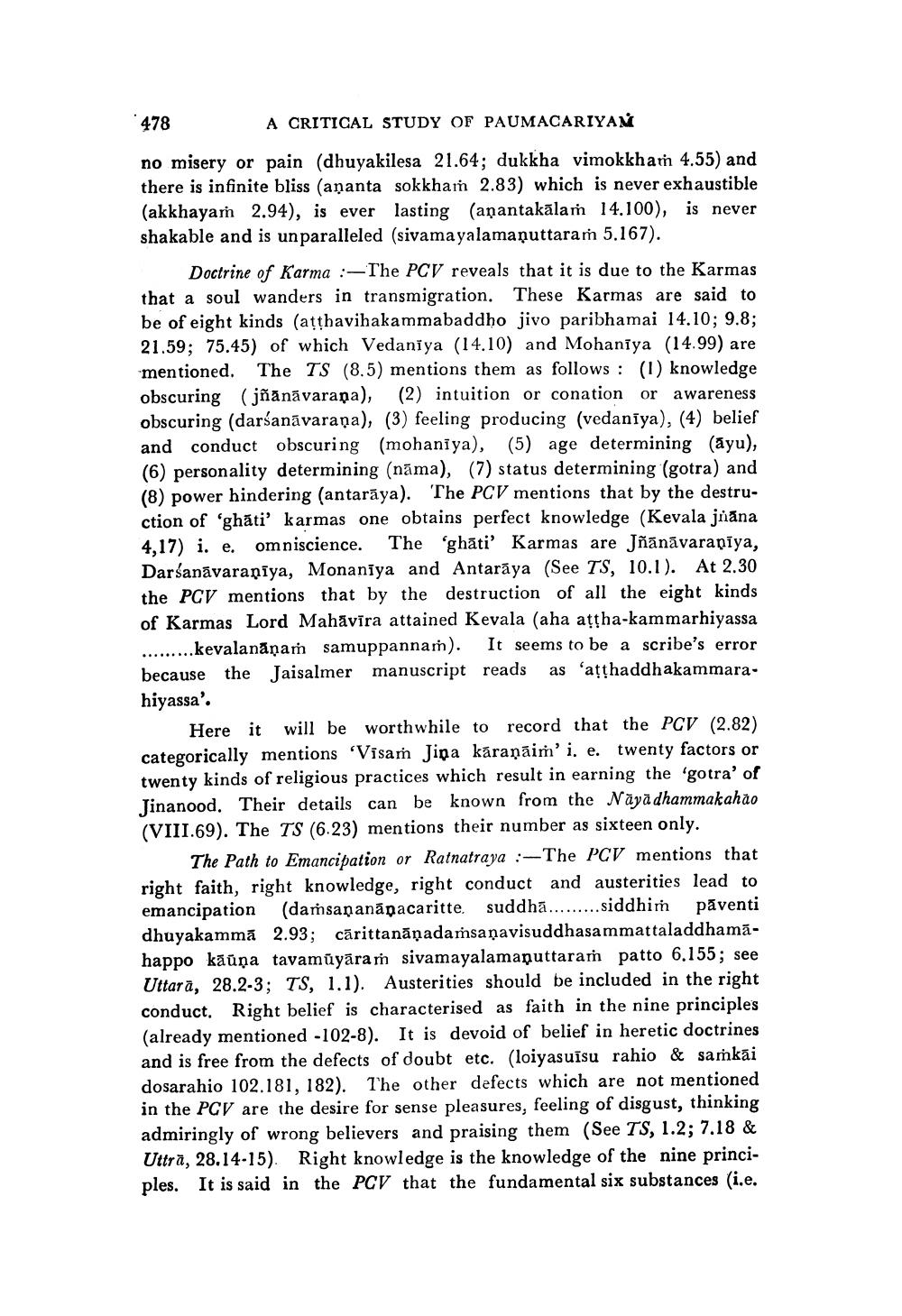________________
478
A CRITICAL STUDY OF PAUMACARIYAM
no misery or pain (dhuyakilesa 21.64; dukkha vimokkham 4.55) and there is infinite bliss (ananta sokkham 2.83) which is never exhaustible (akkhayam 2.94), is ever lasting (anantakalaṁ 14.100), is never shakable and is unparalleled (sivamayalamaņuttaram 5.167).
Doctrine of Karma :-The PCV reveals that it is due to the Karmas that a soul wanders in transmigration. These Karmas are said to be of eight kinds (aṭṭhavihakammabaddho jivo paribhamai 14.10; 9.8; 21.59; 75.45) of which Vedaniya (14.10) and Mohaniya (14.99) are mentioned. The TS (8.5) mentions them as follows: (1) knowledge obscuring (jñānāvaraṇa), (2) intuition or conation or awareness obscuring (darśanavaraṇa), (3) feeling producing (vedaniya), (4) belief and conduct obscuring (mohaniya), (5) age determining (ayu), (6) personality determining (nama), (7) status determining (gotra) and (8) power hindering (antaraya). The PCV mentions that by the destruction of 'ghati' karmas one obtains perfect knowledge (Kevala jñāna 4,17) i. e. omniscience. The 'ghati' Karmas are Jñānāvaraṇīya, Darśanavaraniya, Monaniya and Antaraya (See TS, 10.1). At 2.30 the PCV mentions that by the destruction of all the eight kinds of Karmas Lord Mahāvīra attained Kevala (aha aṭṭha-kammarhiyassa It seems to be a scribe's error ...kevalanāņaṁ samuppannaṁ). because the Jaisalmer manuscript reads as 'atthaddhakammarahiyassa'.
Here it will be worthwhile to record that the PCV (2.82) categorically mentions 'Visam Jiņa kāraņāim' i. e. twenty factors or twenty kinds of religious practices which result in earning the 'gotra' of Jinanood. Their details can be known from the Nayadhammakahão (VIII.69). The TS (6.23) mentions their number as sixteen only.
The Path to Emancipation or Ratnatraya :-The PCV mentions that right faith, right knowledge, right conduct and austerities lead to emancipation (damsanananacaritte. suddha.........siddhim pāventi dhuyakamma 2.93; carittanaṇadamsanavisuddhasammattaladdhamahappo kāūņa tavamüyāram sivamayalamaņuttaram patto 6.155; see Uttara, 28.2-3; TS, 1.1). Austerities should be included in the right conduct. Right belief is characterised as faith in the nine principles (already mentioned -102-8). It is devoid of belief in heretic doctrines and is free from the defects of doubt etc. (loiyasuīsu rahio & samkai dosarahio 102.181, 182). The other defects which are not mentioned in the PCV are the desire for sense pleasures, feeling of disgust, thinking admiringly of wrong believers and praising them (See TS, 1.2; 7.18 & Uttra, 28.14-15). Right knowledge is the knowledge of the nine principles. It is said in the PCV that the fundamental six substances (i.e.




